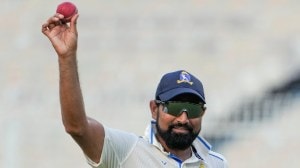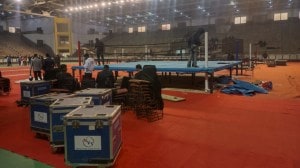NCAER too revises economic growth downward
NCAER too revises economic growth downwardNEW DELHI/MUMBAI, NOV 6: It's better late than never. The National Council of Applied Economic R...

NCAER too revises economic growth downward
NEW DELHI/MUMBAI, NOV 6: It8217;s better late than never. The National Council of Applied Economic Research NCAER too had revised downward the economic growth projections for current fiscal from seven per cent to 6.1 per cent and warned that hike in petroleum prices would push inflation beyond seven per cent during the year. The Reserve Bank of India and the Centre for Monitoring Indian Economy CMIE had last month revised GDP growth downwards.
Cautioning that diminished expectations on overall economic conditions and financial position of corporates had pulled down the Business Confidence Index BCI during July-September, NCAER said buoyant global market and new economic segments were unable to arrest the slowdown.
Sinha8217;s admission on slower growth had come one month after the RBI and the CMIE revised the country8217;s economic growth downwards. NCAER revised the GDP growth downward two days after Sinha admitted the slowdown. Attributing the slowdown in economy to slack growth in industry and agriculture, a survey by the apex research body said quot;a combination of external and domestic shocks has adversely affected the pace of the economic growth in 2000-01.quot;
Inflation rate, based on wholesale price index WPI, was placed at 7.1 per cent, well above the three per cent experienced last year and above the projected five per cent at the beginning of the current fiscal, the survey showed.
NCAER indicated that hike in international price of crude had led to increase in domestic price of petroleum products, and higher POL prices meant higher rate of inflation. Stating that higher import bill had widened the trade deficit in Q1, it said although forex reserves were adequate to cover the increased import bill, firming up of the interest rates in the US and appreciation of the US dollar vis-a-vis other major currencies led to pressure on the exchange rate of the rupee.
Although the RBI and the CMIE had last month revised GDP growth downwards, Finance Minister Sinha refused to admit then that the economy has slowed down and made several arguments refuting the slowdown theory8217;. Climbing down from his earlier stand of no fall in growth8217;, Finance Minister Sinha last week admitted for the first time that the growth rate would drop by one per cent, but said the government would adopt a four-point strategy to reverse the trend.
The RBI pared the country8217;s real Gross Domestic Product in the current fiscal to around 6-6.5 per cent as against the previous projection of 6.5-7 per cent in its April monetary and credit policy. The GDP figure had been arrived at by the apex bank, by taking first quarter April-June data of Central Statistical Organisation which placed the real GDP growth at 5.8 per cent as against 6.9 per cent observed in the first quarter of 1999-2000, RBI said in its mid-term review of monetary and credit policy for 2000-01.
The bank said the rate of inflation on a point-to-point basis, as on September 23, 2000 had almost doubled to 6.06 per cent as against 3.20 per cent a year ago. 8220;On an average, the annual inflation rate stood at 4.96per cent as against 4.37 per cent last year,8221; the RBI said.
It has attributed the rise in inflation to a 25.9 per cent increase in the index of fuel, power, light and lubricants, particularly in the mineral oils. 8220;This is a consequential impact of the substantial rise in international oil prices since September 1999,8221; it said, adding the increase in prices of other items among both the primary articles and manufactured products, except fertilisers, were subdued.
The CSO, in their recent release, has placed the real GDP growth in the first quarter April-June of 2000-01 at 5.8 per cent as against 6.9 per cent observed in the first quarter of 1999-2000. Taking the first quarter estimates into account, as per present indications, the real GDP growth the projection of 6.5 8211; 7.0 per cent indicated in the April policy statement.
Projecting a fall in GDP gross domestic product growth rate to 5.8 per cent from the estimated 7 per cent in the current financial year, Sinha said the strategy would be to contain fiscal deficit, increase exports, push up reforms and ensure a transparent public administration.
- 01
- 02
- 03
- 04
- 05






























